Pharmacology Report: Statin RSD Drug for Metabolic Syndrome Treatment
VerifiedAdded on 2023/06/03
|8
|2190
|172
Report
AI Summary
This pharmacology report evaluates the effects of a Statin Recombinant Drug (RSD) on metabolic syndrome, a condition characterized by insulin resistance and metabolic disorders. The study, a randomized control double-blind experiment, assessed the drug's impact on glucose, insulin, total cholesterol, and triglyceride levels across normal, control, and treatment groups. Results indicated significant improvements in clinical outcomes, with notable reductions in glucose, insulin, total cholesterol, and triglyceride levels. The report concludes that RSD demonstrates considerable potential in reducing lipid levels and mitigating the effects of metabolic syndrome, suggesting its effectiveness in managing patients with the condition and associated risks like coronary heart disease.
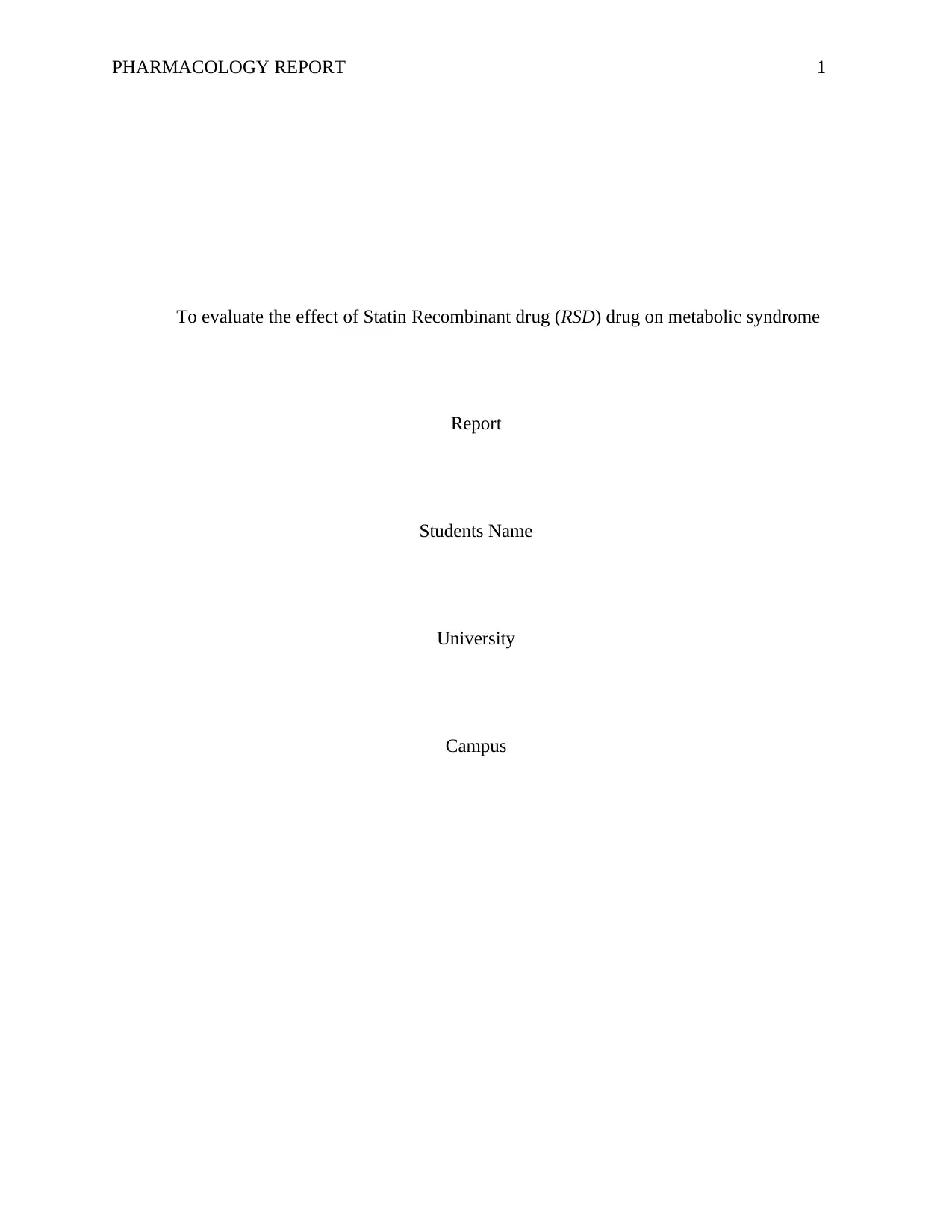
PHARMACOLOGY REPORT 1
To evaluate the effect of Statin Recombinant drug (RSD) drug on metabolic syndrome
Report
Students Name
University
Campus
To evaluate the effect of Statin Recombinant drug (RSD) drug on metabolic syndrome
Report
Students Name
University
Campus
Paraphrase This Document
Need a fresh take? Get an instant paraphrase of this document with our AI Paraphraser
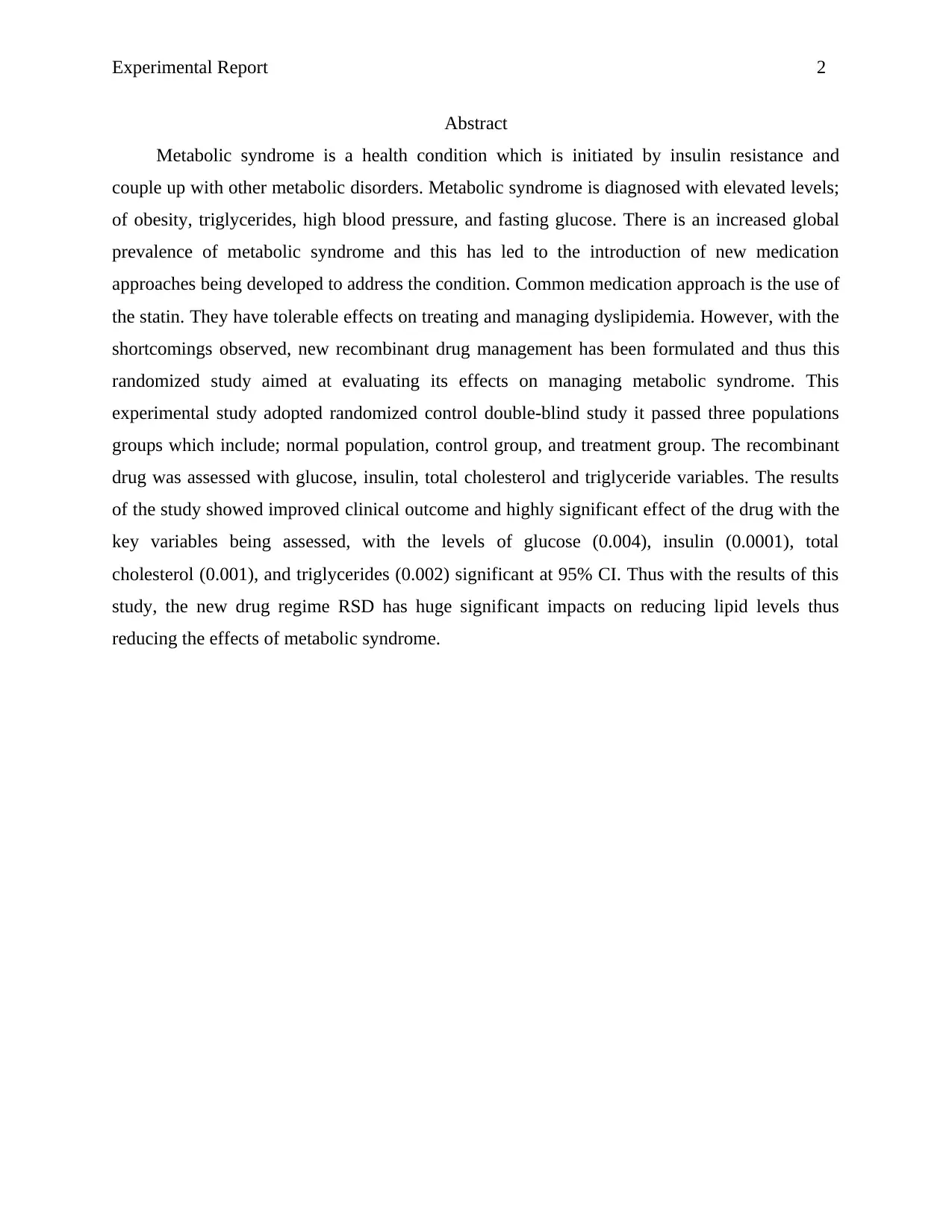
Experimental Report 2
Abstract
Metabolic syndrome is a health condition which is initiated by insulin resistance and
couple up with other metabolic disorders. Metabolic syndrome is diagnosed with elevated levels;
of obesity, triglycerides, high blood pressure, and fasting glucose. There is an increased global
prevalence of metabolic syndrome and this has led to the introduction of new medication
approaches being developed to address the condition. Common medication approach is the use of
the statin. They have tolerable effects on treating and managing dyslipidemia. However, with the
shortcomings observed, new recombinant drug management has been formulated and thus this
randomized study aimed at evaluating its effects on managing metabolic syndrome. This
experimental study adopted randomized control double-blind study it passed three populations
groups which include; normal population, control group, and treatment group. The recombinant
drug was assessed with glucose, insulin, total cholesterol and triglyceride variables. The results
of the study showed improved clinical outcome and highly significant effect of the drug with the
key variables being assessed, with the levels of glucose (0.004), insulin (0.0001), total
cholesterol (0.001), and triglycerides (0.002) significant at 95% CI. Thus with the results of this
study, the new drug regime RSD has huge significant impacts on reducing lipid levels thus
reducing the effects of metabolic syndrome.
Abstract
Metabolic syndrome is a health condition which is initiated by insulin resistance and
couple up with other metabolic disorders. Metabolic syndrome is diagnosed with elevated levels;
of obesity, triglycerides, high blood pressure, and fasting glucose. There is an increased global
prevalence of metabolic syndrome and this has led to the introduction of new medication
approaches being developed to address the condition. Common medication approach is the use of
the statin. They have tolerable effects on treating and managing dyslipidemia. However, with the
shortcomings observed, new recombinant drug management has been formulated and thus this
randomized study aimed at evaluating its effects on managing metabolic syndrome. This
experimental study adopted randomized control double-blind study it passed three populations
groups which include; normal population, control group, and treatment group. The recombinant
drug was assessed with glucose, insulin, total cholesterol and triglyceride variables. The results
of the study showed improved clinical outcome and highly significant effect of the drug with the
key variables being assessed, with the levels of glucose (0.004), insulin (0.0001), total
cholesterol (0.001), and triglycerides (0.002) significant at 95% CI. Thus with the results of this
study, the new drug regime RSD has huge significant impacts on reducing lipid levels thus
reducing the effects of metabolic syndrome.

Experimental Report 3
Evaluation of the effect of Statin Recombinant drug (RSD) drug on metabolic syndrome
Evaluation of the effect of Statin Recombinant drug (RSD) drug on metabolic syndrome
⊘ This is a preview!⊘
Do you want full access?
Subscribe today to unlock all pages.

Trusted by 1+ million students worldwide
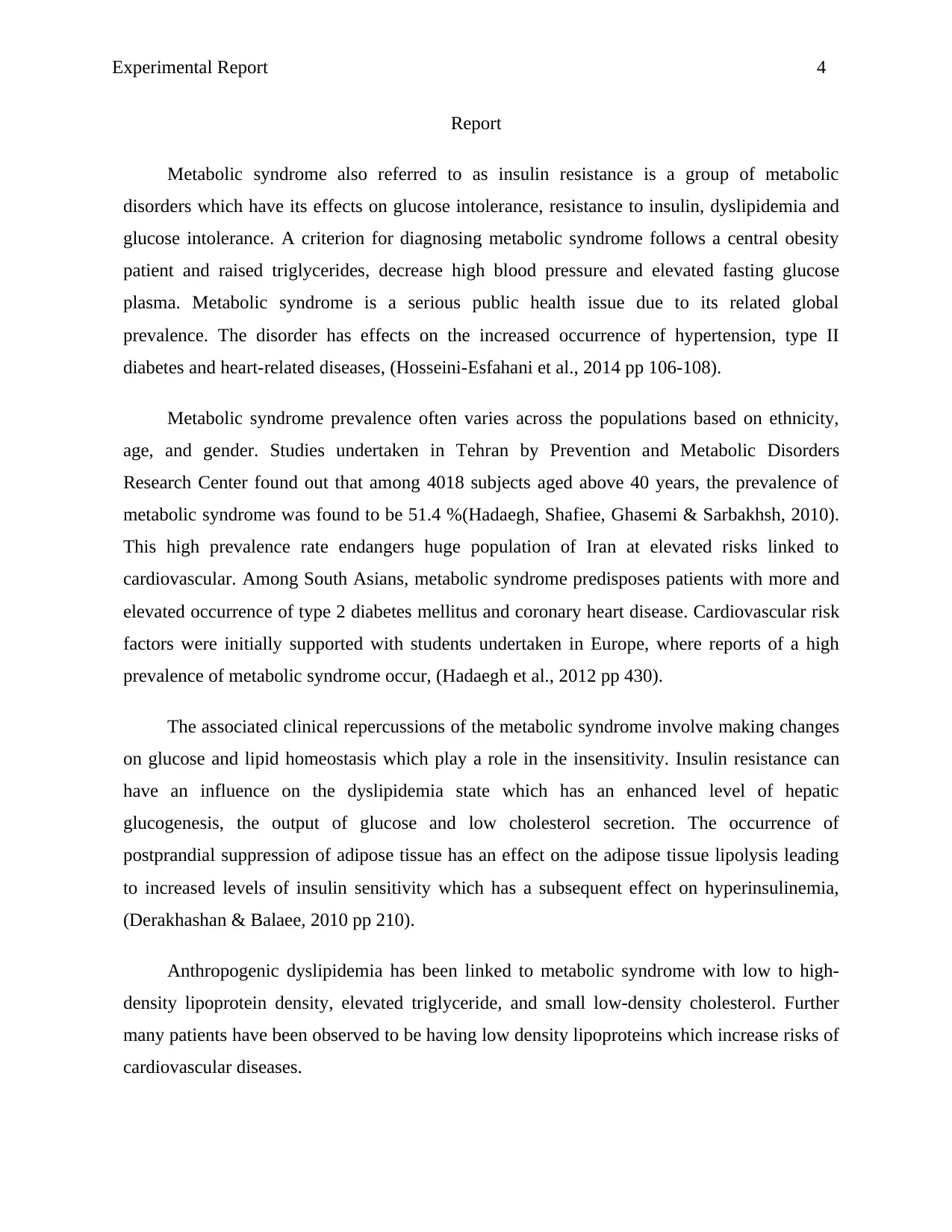
Experimental Report 4
Report
Metabolic syndrome also referred to as insulin resistance is a group of metabolic
disorders which have its effects on glucose intolerance, resistance to insulin, dyslipidemia and
glucose intolerance. A criterion for diagnosing metabolic syndrome follows a central obesity
patient and raised triglycerides, decrease high blood pressure and elevated fasting glucose
plasma. Metabolic syndrome is a serious public health issue due to its related global
prevalence. The disorder has effects on the increased occurrence of hypertension, type II
diabetes and heart-related diseases, (Hosseini-Esfahani et al., 2014 pp 106-108).
Metabolic syndrome prevalence often varies across the populations based on ethnicity,
age, and gender. Studies undertaken in Tehran by Prevention and Metabolic Disorders
Research Center found out that among 4018 subjects aged above 40 years, the prevalence of
metabolic syndrome was found to be 51.4 %(Hadaegh, Shafiee, Ghasemi & Sarbakhsh, 2010).
This high prevalence rate endangers huge population of Iran at elevated risks linked to
cardiovascular. Among South Asians, metabolic syndrome predisposes patients with more and
elevated occurrence of type 2 diabetes mellitus and coronary heart disease. Cardiovascular risk
factors were initially supported with students undertaken in Europe, where reports of a high
prevalence of metabolic syndrome occur, (Hadaegh et al., 2012 pp 430).
The associated clinical repercussions of the metabolic syndrome involve making changes
on glucose and lipid homeostasis which play a role in the insensitivity. Insulin resistance can
have an influence on the dyslipidemia state which has an enhanced level of hepatic
glucogenesis, the output of glucose and low cholesterol secretion. The occurrence of
postprandial suppression of adipose tissue has an effect on the adipose tissue lipolysis leading
to increased levels of insulin sensitivity which has a subsequent effect on hyperinsulinemia,
(Derakhashan & Balaee, 2010 pp 210).
Anthropogenic dyslipidemia has been linked to metabolic syndrome with low to high-
density lipoprotein density, elevated triglyceride, and small low-density cholesterol. Further
many patients have been observed to be having low density lipoproteins which increase risks of
cardiovascular diseases.
Report
Metabolic syndrome also referred to as insulin resistance is a group of metabolic
disorders which have its effects on glucose intolerance, resistance to insulin, dyslipidemia and
glucose intolerance. A criterion for diagnosing metabolic syndrome follows a central obesity
patient and raised triglycerides, decrease high blood pressure and elevated fasting glucose
plasma. Metabolic syndrome is a serious public health issue due to its related global
prevalence. The disorder has effects on the increased occurrence of hypertension, type II
diabetes and heart-related diseases, (Hosseini-Esfahani et al., 2014 pp 106-108).
Metabolic syndrome prevalence often varies across the populations based on ethnicity,
age, and gender. Studies undertaken in Tehran by Prevention and Metabolic Disorders
Research Center found out that among 4018 subjects aged above 40 years, the prevalence of
metabolic syndrome was found to be 51.4 %(Hadaegh, Shafiee, Ghasemi & Sarbakhsh, 2010).
This high prevalence rate endangers huge population of Iran at elevated risks linked to
cardiovascular. Among South Asians, metabolic syndrome predisposes patients with more and
elevated occurrence of type 2 diabetes mellitus and coronary heart disease. Cardiovascular risk
factors were initially supported with students undertaken in Europe, where reports of a high
prevalence of metabolic syndrome occur, (Hadaegh et al., 2012 pp 430).
The associated clinical repercussions of the metabolic syndrome involve making changes
on glucose and lipid homeostasis which play a role in the insensitivity. Insulin resistance can
have an influence on the dyslipidemia state which has an enhanced level of hepatic
glucogenesis, the output of glucose and low cholesterol secretion. The occurrence of
postprandial suppression of adipose tissue has an effect on the adipose tissue lipolysis leading
to increased levels of insulin sensitivity which has a subsequent effect on hyperinsulinemia,
(Derakhashan & Balaee, 2010 pp 210).
Anthropogenic dyslipidemia has been linked to metabolic syndrome with low to high-
density lipoprotein density, elevated triglyceride, and small low-density cholesterol. Further
many patients have been observed to be having low density lipoproteins which increase risks of
cardiovascular diseases.
Paraphrase This Document
Need a fresh take? Get an instant paraphrase of this document with our AI Paraphraser
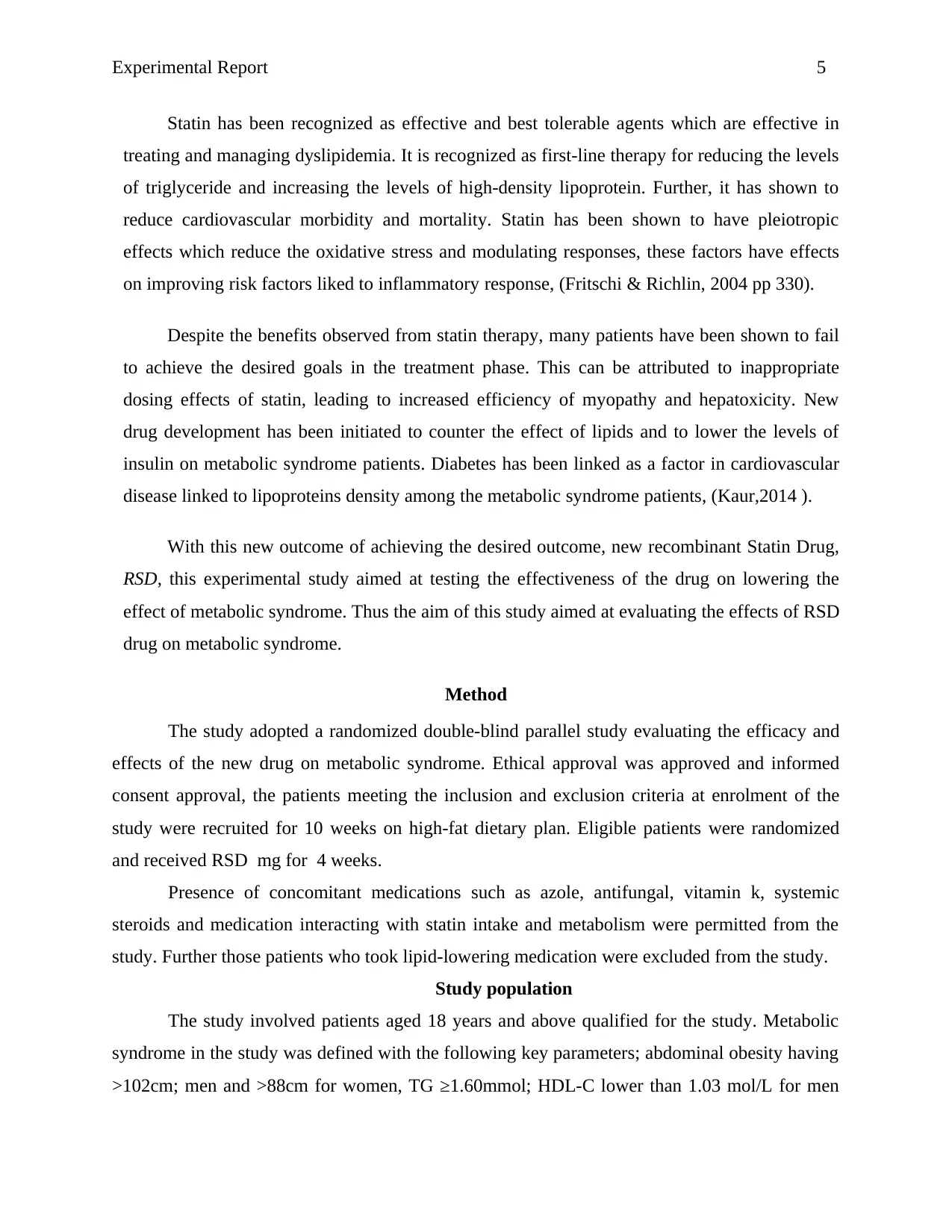
Experimental Report 5
Statin has been recognized as effective and best tolerable agents which are effective in
treating and managing dyslipidemia. It is recognized as first-line therapy for reducing the levels
of triglyceride and increasing the levels of high-density lipoprotein. Further, it has shown to
reduce cardiovascular morbidity and mortality. Statin has been shown to have pleiotropic
effects which reduce the oxidative stress and modulating responses, these factors have effects
on improving risk factors liked to inflammatory response, (Fritschi & Richlin, 2004 pp 330).
Despite the benefits observed from statin therapy, many patients have been shown to fail
to achieve the desired goals in the treatment phase. This can be attributed to inappropriate
dosing effects of statin, leading to increased efficiency of myopathy and hepatoxicity. New
drug development has been initiated to counter the effect of lipids and to lower the levels of
insulin on metabolic syndrome patients. Diabetes has been linked as a factor in cardiovascular
disease linked to lipoproteins density among the metabolic syndrome patients, (Kaur,2014 ).
With this new outcome of achieving the desired outcome, new recombinant Statin Drug,
RSD, this experimental study aimed at testing the effectiveness of the drug on lowering the
effect of metabolic syndrome. Thus the aim of this study aimed at evaluating the effects of RSD
drug on metabolic syndrome.
Method
The study adopted a randomized double-blind parallel study evaluating the efficacy and
effects of the new drug on metabolic syndrome. Ethical approval was approved and informed
consent approval, the patients meeting the inclusion and exclusion criteria at enrolment of the
study were recruited for 10 weeks on high-fat dietary plan. Eligible patients were randomized
and received RSD mg for 4 weeks.
Presence of concomitant medications such as azole, antifungal, vitamin k, systemic
steroids and medication interacting with statin intake and metabolism were permitted from the
study. Further those patients who took lipid-lowering medication were excluded from the study.
Study population
The study involved patients aged 18 years and above qualified for the study. Metabolic
syndrome in the study was defined with the following key parameters; abdominal obesity having
>102cm; men and >88cm for women, TG ≥1.60mmol; HDL-C lower than 1.03 mol/L for men
Statin has been recognized as effective and best tolerable agents which are effective in
treating and managing dyslipidemia. It is recognized as first-line therapy for reducing the levels
of triglyceride and increasing the levels of high-density lipoprotein. Further, it has shown to
reduce cardiovascular morbidity and mortality. Statin has been shown to have pleiotropic
effects which reduce the oxidative stress and modulating responses, these factors have effects
on improving risk factors liked to inflammatory response, (Fritschi & Richlin, 2004 pp 330).
Despite the benefits observed from statin therapy, many patients have been shown to fail
to achieve the desired goals in the treatment phase. This can be attributed to inappropriate
dosing effects of statin, leading to increased efficiency of myopathy and hepatoxicity. New
drug development has been initiated to counter the effect of lipids and to lower the levels of
insulin on metabolic syndrome patients. Diabetes has been linked as a factor in cardiovascular
disease linked to lipoproteins density among the metabolic syndrome patients, (Kaur,2014 ).
With this new outcome of achieving the desired outcome, new recombinant Statin Drug,
RSD, this experimental study aimed at testing the effectiveness of the drug on lowering the
effect of metabolic syndrome. Thus the aim of this study aimed at evaluating the effects of RSD
drug on metabolic syndrome.
Method
The study adopted a randomized double-blind parallel study evaluating the efficacy and
effects of the new drug on metabolic syndrome. Ethical approval was approved and informed
consent approval, the patients meeting the inclusion and exclusion criteria at enrolment of the
study were recruited for 10 weeks on high-fat dietary plan. Eligible patients were randomized
and received RSD mg for 4 weeks.
Presence of concomitant medications such as azole, antifungal, vitamin k, systemic
steroids and medication interacting with statin intake and metabolism were permitted from the
study. Further those patients who took lipid-lowering medication were excluded from the study.
Study population
The study involved patients aged 18 years and above qualified for the study. Metabolic
syndrome in the study was defined with the following key parameters; abdominal obesity having
>102cm; men and >88cm for women, TG ≥1.60mmol; HDL-C lower than 1.03 mol/L for men
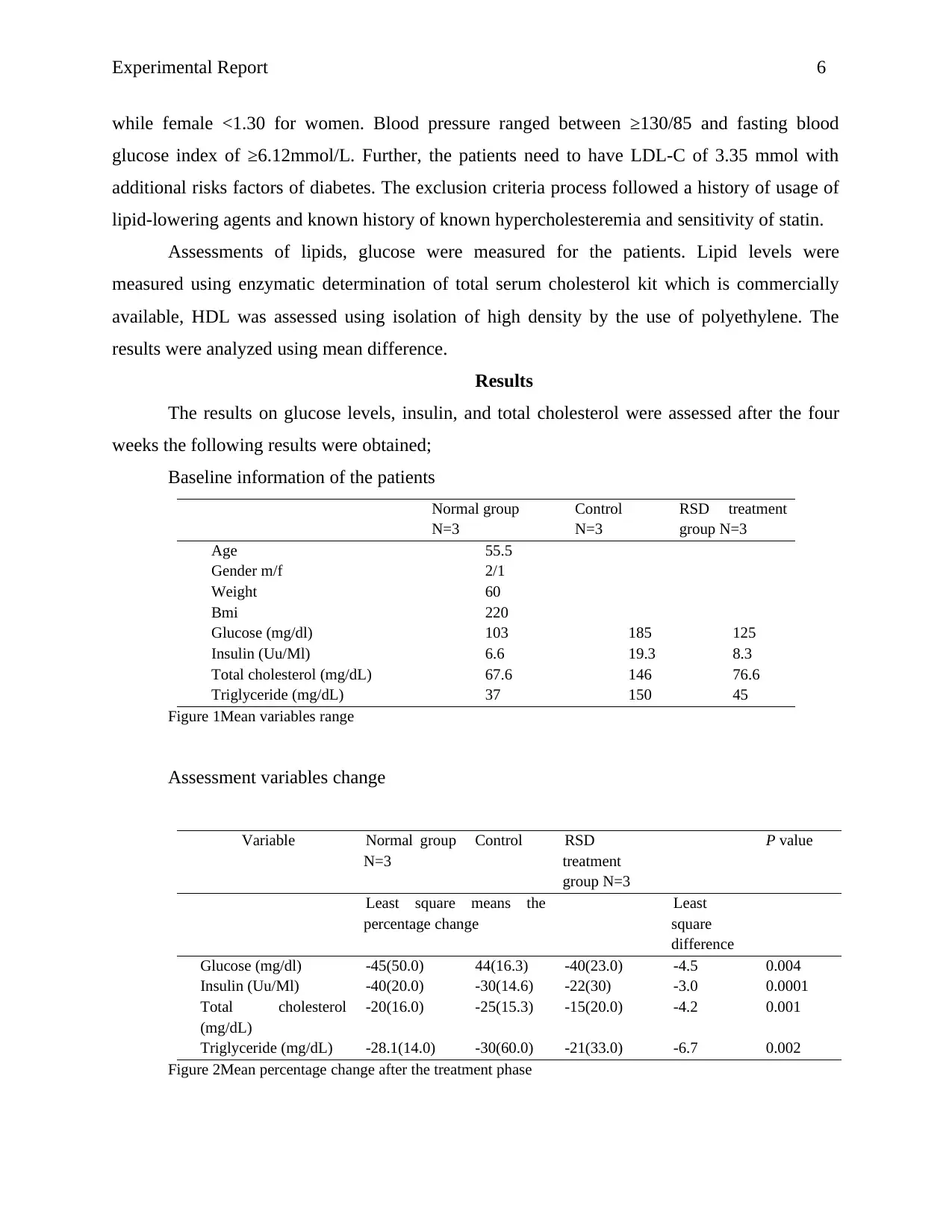
Experimental Report 6
while female <1.30 for women. Blood pressure ranged between ≥130/85 and fasting blood
glucose index of ≥6.12mmol/L. Further, the patients need to have LDL-C of 3.35 mmol with
additional risks factors of diabetes. The exclusion criteria process followed a history of usage of
lipid-lowering agents and known history of known hypercholesteremia and sensitivity of statin.
Assessments of lipids, glucose were measured for the patients. Lipid levels were
measured using enzymatic determination of total serum cholesterol kit which is commercially
available, HDL was assessed using isolation of high density by the use of polyethylene. The
results were analyzed using mean difference.
Results
The results on glucose levels, insulin, and total cholesterol were assessed after the four
weeks the following results were obtained;
Baseline information of the patients
Normal group
N=3
Control
N=3
RSD treatment
group N=3
Age 55.5
Gender m/f 2/1
Weight 60
Bmi 220
Glucose (mg/dl) 103 185 125
Insulin (Uu/Ml) 6.6 19.3 8.3
Total cholesterol (mg/dL) 67.6 146 76.6
Triglyceride (mg/dL) 37 150 45
Figure 1Mean variables range
Assessment variables change
Variable Normal group
N=3
Control RSD
treatment
group N=3
P value
Least square means the
percentage change
Least
square
difference
Glucose (mg/dl) -45(50.0) 44(16.3) -40(23.0) -4.5 0.004
Insulin (Uu/Ml) -40(20.0) -30(14.6) -22(30) -3.0 0.0001
Total cholesterol
(mg/dL)
-20(16.0) -25(15.3) -15(20.0) -4.2 0.001
Triglyceride (mg/dL) -28.1(14.0) -30(60.0) -21(33.0) -6.7 0.002
Figure 2Mean percentage change after the treatment phase
while female <1.30 for women. Blood pressure ranged between ≥130/85 and fasting blood
glucose index of ≥6.12mmol/L. Further, the patients need to have LDL-C of 3.35 mmol with
additional risks factors of diabetes. The exclusion criteria process followed a history of usage of
lipid-lowering agents and known history of known hypercholesteremia and sensitivity of statin.
Assessments of lipids, glucose were measured for the patients. Lipid levels were
measured using enzymatic determination of total serum cholesterol kit which is commercially
available, HDL was assessed using isolation of high density by the use of polyethylene. The
results were analyzed using mean difference.
Results
The results on glucose levels, insulin, and total cholesterol were assessed after the four
weeks the following results were obtained;
Baseline information of the patients
Normal group
N=3
Control
N=3
RSD treatment
group N=3
Age 55.5
Gender m/f 2/1
Weight 60
Bmi 220
Glucose (mg/dl) 103 185 125
Insulin (Uu/Ml) 6.6 19.3 8.3
Total cholesterol (mg/dL) 67.6 146 76.6
Triglyceride (mg/dL) 37 150 45
Figure 1Mean variables range
Assessment variables change
Variable Normal group
N=3
Control RSD
treatment
group N=3
P value
Least square means the
percentage change
Least
square
difference
Glucose (mg/dl) -45(50.0) 44(16.3) -40(23.0) -4.5 0.004
Insulin (Uu/Ml) -40(20.0) -30(14.6) -22(30) -3.0 0.0001
Total cholesterol
(mg/dL)
-20(16.0) -25(15.3) -15(20.0) -4.2 0.001
Triglyceride (mg/dL) -28.1(14.0) -30(60.0) -21(33.0) -6.7 0.002
Figure 2Mean percentage change after the treatment phase
⊘ This is a preview!⊘
Do you want full access?
Subscribe today to unlock all pages.

Trusted by 1+ million students worldwide
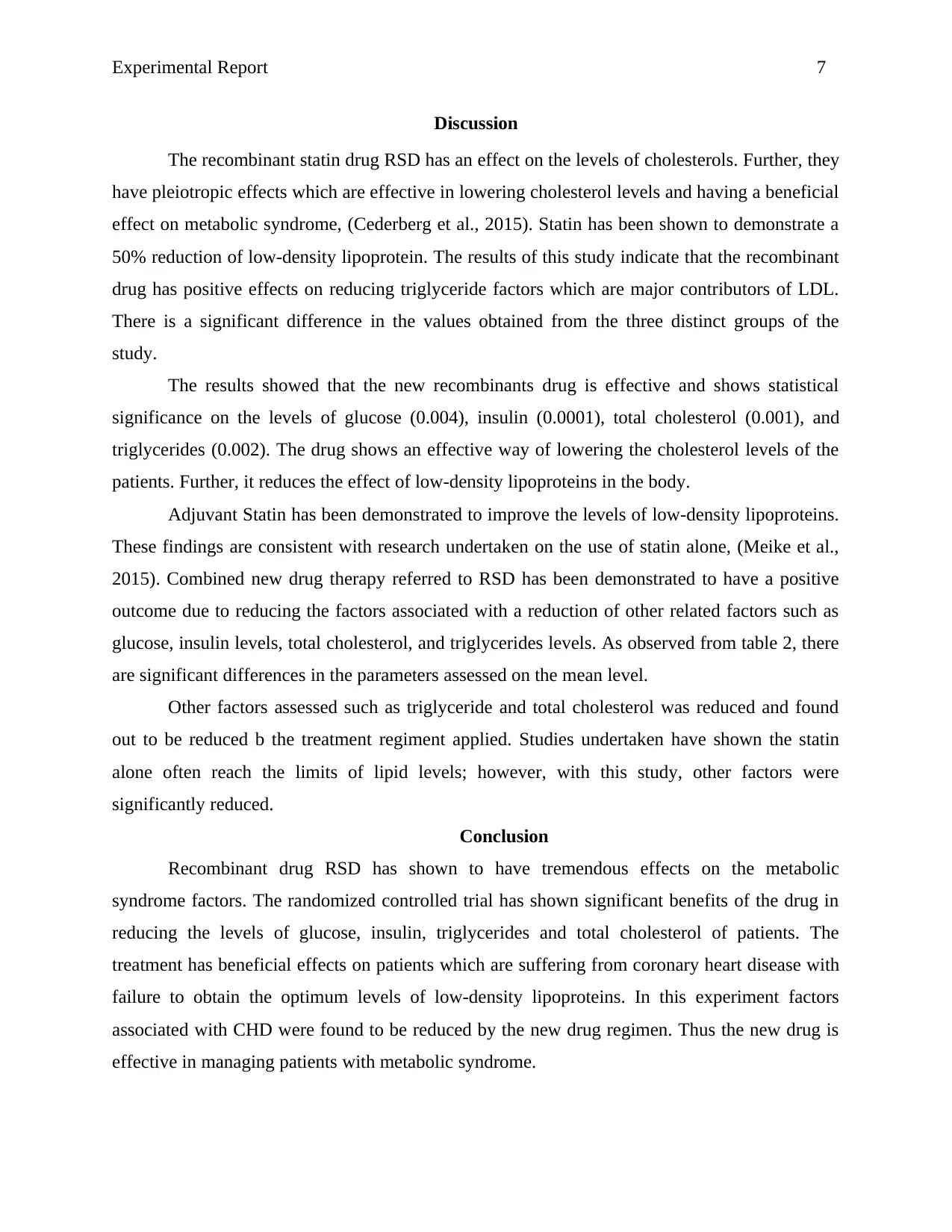
Experimental Report 7
Discussion
The recombinant statin drug RSD has an effect on the levels of cholesterols. Further, they
have pleiotropic effects which are effective in lowering cholesterol levels and having a beneficial
effect on metabolic syndrome, (Cederberg et al., 2015). Statin has been shown to demonstrate a
50% reduction of low-density lipoprotein. The results of this study indicate that the recombinant
drug has positive effects on reducing triglyceride factors which are major contributors of LDL.
There is a significant difference in the values obtained from the three distinct groups of the
study.
The results showed that the new recombinants drug is effective and shows statistical
significance on the levels of glucose (0.004), insulin (0.0001), total cholesterol (0.001), and
triglycerides (0.002). The drug shows an effective way of lowering the cholesterol levels of the
patients. Further, it reduces the effect of low-density lipoproteins in the body.
Adjuvant Statin has been demonstrated to improve the levels of low-density lipoproteins.
These findings are consistent with research undertaken on the use of statin alone, (Meike et al.,
2015). Combined new drug therapy referred to RSD has been demonstrated to have a positive
outcome due to reducing the factors associated with a reduction of other related factors such as
glucose, insulin levels, total cholesterol, and triglycerides levels. As observed from table 2, there
are significant differences in the parameters assessed on the mean level.
Other factors assessed such as triglyceride and total cholesterol was reduced and found
out to be reduced b the treatment regiment applied. Studies undertaken have shown the statin
alone often reach the limits of lipid levels; however, with this study, other factors were
significantly reduced.
Conclusion
Recombinant drug RSD has shown to have tremendous effects on the metabolic
syndrome factors. The randomized controlled trial has shown significant benefits of the drug in
reducing the levels of glucose, insulin, triglycerides and total cholesterol of patients. The
treatment has beneficial effects on patients which are suffering from coronary heart disease with
failure to obtain the optimum levels of low-density lipoproteins. In this experiment factors
associated with CHD were found to be reduced by the new drug regimen. Thus the new drug is
effective in managing patients with metabolic syndrome.
Discussion
The recombinant statin drug RSD has an effect on the levels of cholesterols. Further, they
have pleiotropic effects which are effective in lowering cholesterol levels and having a beneficial
effect on metabolic syndrome, (Cederberg et al., 2015). Statin has been shown to demonstrate a
50% reduction of low-density lipoprotein. The results of this study indicate that the recombinant
drug has positive effects on reducing triglyceride factors which are major contributors of LDL.
There is a significant difference in the values obtained from the three distinct groups of the
study.
The results showed that the new recombinants drug is effective and shows statistical
significance on the levels of glucose (0.004), insulin (0.0001), total cholesterol (0.001), and
triglycerides (0.002). The drug shows an effective way of lowering the cholesterol levels of the
patients. Further, it reduces the effect of low-density lipoproteins in the body.
Adjuvant Statin has been demonstrated to improve the levels of low-density lipoproteins.
These findings are consistent with research undertaken on the use of statin alone, (Meike et al.,
2015). Combined new drug therapy referred to RSD has been demonstrated to have a positive
outcome due to reducing the factors associated with a reduction of other related factors such as
glucose, insulin levels, total cholesterol, and triglycerides levels. As observed from table 2, there
are significant differences in the parameters assessed on the mean level.
Other factors assessed such as triglyceride and total cholesterol was reduced and found
out to be reduced b the treatment regiment applied. Studies undertaken have shown the statin
alone often reach the limits of lipid levels; however, with this study, other factors were
significantly reduced.
Conclusion
Recombinant drug RSD has shown to have tremendous effects on the metabolic
syndrome factors. The randomized controlled trial has shown significant benefits of the drug in
reducing the levels of glucose, insulin, triglycerides and total cholesterol of patients. The
treatment has beneficial effects on patients which are suffering from coronary heart disease with
failure to obtain the optimum levels of low-density lipoproteins. In this experiment factors
associated with CHD were found to be reduced by the new drug regimen. Thus the new drug is
effective in managing patients with metabolic syndrome.
Paraphrase This Document
Need a fresh take? Get an instant paraphrase of this document with our AI Paraphraser
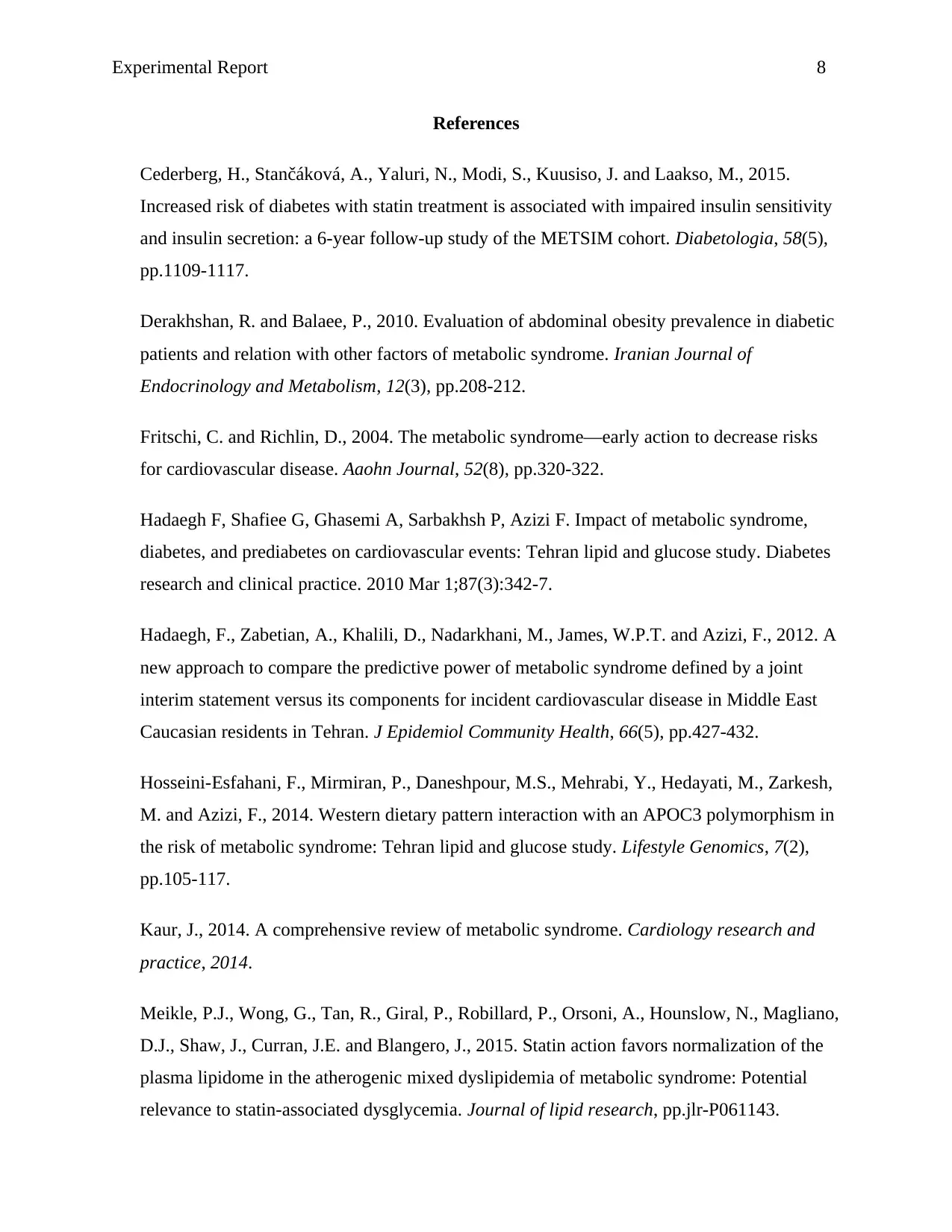
Experimental Report 8
References
Cederberg, H., Stančáková, A., Yaluri, N., Modi, S., Kuusiso, J. and Laakso, M., 2015.
Increased risk of diabetes with statin treatment is associated with impaired insulin sensitivity
and insulin secretion: a 6-year follow-up study of the METSIM cohort. Diabetologia, 58(5),
pp.1109-1117.
Derakhshan, R. and Balaee, P., 2010. Evaluation of abdominal obesity prevalence in diabetic
patients and relation with other factors of metabolic syndrome. Iranian Journal of
Endocrinology and Metabolism, 12(3), pp.208-212.
Fritschi, C. and Richlin, D., 2004. The metabolic syndrome—early action to decrease risks
for cardiovascular disease. Aaohn Journal, 52(8), pp.320-322.
Hadaegh F, Shafiee G, Ghasemi A, Sarbakhsh P, Azizi F. Impact of metabolic syndrome,
diabetes, and prediabetes on cardiovascular events: Tehran lipid and glucose study. Diabetes
research and clinical practice. 2010 Mar 1;87(3):342-7.
Hadaegh, F., Zabetian, A., Khalili, D., Nadarkhani, M., James, W.P.T. and Azizi, F., 2012. A
new approach to compare the predictive power of metabolic syndrome defined by a joint
interim statement versus its components for incident cardiovascular disease in Middle East
Caucasian residents in Tehran. J Epidemiol Community Health, 66(5), pp.427-432.
Hosseini-Esfahani, F., Mirmiran, P., Daneshpour, M.S., Mehrabi, Y., Hedayati, M., Zarkesh,
M. and Azizi, F., 2014. Western dietary pattern interaction with an APOC3 polymorphism in
the risk of metabolic syndrome: Tehran lipid and glucose study. Lifestyle Genomics, 7(2),
pp.105-117.
Kaur, J., 2014. A comprehensive review of metabolic syndrome. Cardiology research and
practice, 2014.
Meikle, P.J., Wong, G., Tan, R., Giral, P., Robillard, P., Orsoni, A., Hounslow, N., Magliano,
D.J., Shaw, J., Curran, J.E. and Blangero, J., 2015. Statin action favors normalization of the
plasma lipidome in the atherogenic mixed dyslipidemia of metabolic syndrome: Potential
relevance to statin-associated dysglycemia. Journal of lipid research, pp.jlr-P061143.
References
Cederberg, H., Stančáková, A., Yaluri, N., Modi, S., Kuusiso, J. and Laakso, M., 2015.
Increased risk of diabetes with statin treatment is associated with impaired insulin sensitivity
and insulin secretion: a 6-year follow-up study of the METSIM cohort. Diabetologia, 58(5),
pp.1109-1117.
Derakhshan, R. and Balaee, P., 2010. Evaluation of abdominal obesity prevalence in diabetic
patients and relation with other factors of metabolic syndrome. Iranian Journal of
Endocrinology and Metabolism, 12(3), pp.208-212.
Fritschi, C. and Richlin, D., 2004. The metabolic syndrome—early action to decrease risks
for cardiovascular disease. Aaohn Journal, 52(8), pp.320-322.
Hadaegh F, Shafiee G, Ghasemi A, Sarbakhsh P, Azizi F. Impact of metabolic syndrome,
diabetes, and prediabetes on cardiovascular events: Tehran lipid and glucose study. Diabetes
research and clinical practice. 2010 Mar 1;87(3):342-7.
Hadaegh, F., Zabetian, A., Khalili, D., Nadarkhani, M., James, W.P.T. and Azizi, F., 2012. A
new approach to compare the predictive power of metabolic syndrome defined by a joint
interim statement versus its components for incident cardiovascular disease in Middle East
Caucasian residents in Tehran. J Epidemiol Community Health, 66(5), pp.427-432.
Hosseini-Esfahani, F., Mirmiran, P., Daneshpour, M.S., Mehrabi, Y., Hedayati, M., Zarkesh,
M. and Azizi, F., 2014. Western dietary pattern interaction with an APOC3 polymorphism in
the risk of metabolic syndrome: Tehran lipid and glucose study. Lifestyle Genomics, 7(2),
pp.105-117.
Kaur, J., 2014. A comprehensive review of metabolic syndrome. Cardiology research and
practice, 2014.
Meikle, P.J., Wong, G., Tan, R., Giral, P., Robillard, P., Orsoni, A., Hounslow, N., Magliano,
D.J., Shaw, J., Curran, J.E. and Blangero, J., 2015. Statin action favors normalization of the
plasma lipidome in the atherogenic mixed dyslipidemia of metabolic syndrome: Potential
relevance to statin-associated dysglycemia. Journal of lipid research, pp.jlr-P061143.
1 out of 8
Related Documents
Your All-in-One AI-Powered Toolkit for Academic Success.
+13062052269
info@desklib.com
Available 24*7 on WhatsApp / Email
![[object Object]](/_next/static/media/star-bottom.7253800d.svg)
Unlock your academic potential
Copyright © 2020–2026 A2Z Services. All Rights Reserved. Developed and managed by ZUCOL.





